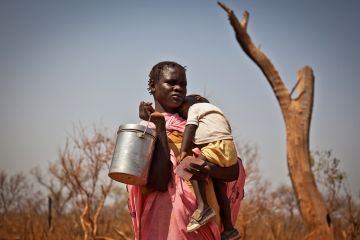Global Roundup: Rape Threat Relativity in South Sudan; Women Divorce Proudly in Nepal
Weekly global roundup: Nepali women learn about their right to divorce and increasingly do so; Argentina's new Gender Identity Law first in the world; Tanzania's President petitioned over contraception access; relativity in rape threats for women in South Sudan.

Nepal: More Divorce Means More Women Exercising Their Rights
Global Press Institute (GPI) reports on the complex evolution of Nepal’s divorce law over recent decades. An increased awareness of the law as it has changed, has compelled exponential number of women to seek divorces, they report. The number of cases filed in 2005 to 2006 was 640; from 2010 to 2011, there were 1,317 cases filed. Divorce was first legalized in Nepal in 1963, with the law was updated in 2002 to include additional grounds for divorce and implementing protective measures for women’s property ownership following divorce. GPI finds that it is easier for women to legally file for divorce than men, due to a difference in proceedings, yet not easier socially. Stigma around divorced women and single motherhood persist, and a 2011 governmental report found that property rights are rarely granted to women following divorce. Nonetheless, advocates have continued to push for expanded rights of women – for instance, a civil code bill introduced in 2011 makes marital rape grounds for divorce – while local NGOs continue to educate women broadly about their rights so that they are empowered and equipped to exercise them fully. Via Global Press Institute.
Argentina: Gender Identity Law Makes History
Last week, Argentina’s Congress approved – by a 55 to 0 margin – a Gender Identity Law that no longer requires trans individuals to go to court to legally re-assign their gender, and obligates health insurances companies from covering sex re-assignment surgery or hormone therapy on-demand. It’s a major breakthrough for the world on trans rights, but also for Latin America, a region traditionally known for macho attitudes. Argentina legalized same-sex marriage in 2010 under President Christina Fernandez de Kirchner. Though they are distinct, queer rights and reproductive rights often go hand in hand, or rather neck in neck, as litmus tests of a society’s ability to uphold human rights principles. While it’s amazing news, it’s notable that abortion is still quite restricted in Argentina. It would be great if the new Gender Identity Law would also support women, who want to identify as women, in exercising their sexual rights free from restriction. Moreover, while President Obama made a splash last week by coming out in support of same sex marriage in the US, women’s reproductive rights in the country continue to be whittled down by oppressive policies. Via Foreign Policy.
Tanzania: Step it Up on Contraception Access
Several Members of Parliament (MPs), part of the Parliamentary Family Planning Club (sounds like an awesome club), have petitioned Tanzania’s President to specifically include a budget line for contraceptive supplies in the country’s five-year development plan. Not including specific and well-funded efforts to address access to contraception will undermine the government’s broader efforts to reduce maternal mortality, the petition says. This shouldn’t be a tough sell to President Kikwete, who is an internationally recognized champion on women’s health issues and sits on an elite advisory board for a major United Nations effort to improve women’s and children’s health. Increasingly, a specific focus on contraception access and supplies is seen as entirely critical to making any headway in reducing maternal, infant, and child deaths. It’s unfortunate that the case still needs to be made that ensuring adequate contraceptive supplies, and unfettered access to that supplies, is a major step in reducing maternal deaths and injuries, and importantly bestows the agency upon women that they seek to begin with – the control their own fertility and bodies. Via All Africa.
South Sudan: Less Rape in Refugee Camps Still “Safer” for Women
Working for the International Rescue Committee (IRC) on the ground in South Sudan, women’s protection specialist Elizabeth Pender writes about the experience for women at the Yida refugee camp. The camp is home to 30,000 people, many of them women and children. New additions have fled outrageous sexual violence and threats in the Nuba Mountains, making those they almost certainly face within camps pale in comparison. It’s a “grim illustration of the conditions women and girls face at Yida camp that a place where they risk being raped every time they go to the market or beaten by their husbands every time they go home, is safe compared to where they came from,” Pender writes. The reports Pender and others are hearing are every bit as horrific, but not all together surprising: women being “taken” by military men as wives for indefinite amounts of time and brutal rapes committed in front of family members. Protection of women and girls is a major issue in the camps. Five hundred girls arrived from a boarding school without family members or teachers in tow to help guard against predators, and their mobility is paralyzed by the constant threat of rape. One solution has been to create an all-girls compound for safety, but the reality, writes Pender, has been, “overcrowding, not enough food, no bathing area, one latrine for every 100 girls, no gate and no guards.” As fighting persists along the South Sudan border, the issue of sexual violence and women’s rights is quickly becoming the central issue – if it was not already. Via Global Post.

